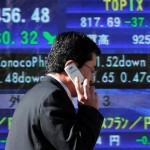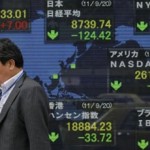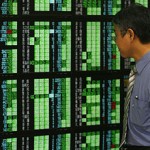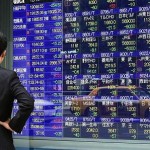Major Asian stocks close up, Nikkei rebounds 2.88%

Asia markets closed mostly higher, with some major indexes rebounding Wednesday, in a sign of returning stability even in the face of lingering worries about China and falling commodity prices.
That follows a volatile start to the year, in which Chinese stocks plunged, spurring a global market rout.
“This [volatility] is not likely about the Chinese stock market itself, but instead all about one of the drivers of the Chinese stock market – namely the Chinese currency, the renminbi,” Bank of America Merrill Lynch said in a note on Tuesday, noting that the currency fell more than 1.5 percent against the dollar last week.
“Within the mix of policy changes in response to what transpired last week – including the removal of circuit breakers in the Chinese equity market, etc. – it is very clear that the PBOC is now working to stabilize the renminbi.”
Chinese exports decline
Chinese markets gave up early gains on the back of sluggish trade data. The Shanghai composite erased early gains of as much as 0.74 percent to trade down 0.46 percent. The smaller Shenzhen compositewas down 0.89 percent, while the CSI 300 was down 0.16 percent.
China’s December exports fell 1.4 percent on year in dollar-denominated terms, while imports slid 7.6 percent, leaving a trade surplus of $60.09 billion for the month, according to official data. While the data beat a Reuters poll forecasting dollar-denominated exports to fall 8 percent and imports to decline 11.5 percent, it still marked a sixth month of year-on-year export declines.
But offering another sign of market stability, the People’s Bank of China (PBOC) kept the yuan mid-point fix steady once again, setting it at 6.5630, compared to yesterday’s fix of 6.5628.
Australia’s ASX 200 index closed up 62.26 points, or 1.26 percent, at 4,987, buoyed by the financials and information technology sectors, which were up 1.86 and 1.64 percent respectively. The materials sector trimmed some of earlier losses to trade down 0.33 percent.
The Australian dollar initially strengthened after yuan-denominated China trade figures were released, rising as high as $0.7048, compared with about $0.7018 before the data. But the Aussie later retreated to about $0.7021.
In Japan, the Nikkei 225 recovered all of Tuesday’s 2.71 percent drop, to close 496.67 points, or 2.88 percent, higher at 17,715.63, while South Korea’s Kospi saw gains of 25.42 points, or 1.34 percent, to end at 1,916.28.
Energy plays climb as oil bounces
Evan Lucas, market strategist from spreadbetter IG, wrote in his morning note that oil prices remained the biggest story for markets, noting that he expected oil to hit $20 a barrel.
In Asian trade, U.S. crude futures were up 1.12 percent at $30.78 a barrel, after falling as low as $29.93 in the intraday session in the U.S. The global benchmark Brent crude was up 0.65 percent at $31.06 a barrel.
Energy plays saw some gains on the back of the uptick in oil prices, with shares of Santos closing up 5.42 percent, Woodside Petroleum1.33 percent higher and Oil Search finishing 1.44 percent up . Inpex andJapan Petroleum ended up 0.68 and 1.75 percent respectively, while South Korean energy plays eked out gains of between 0.3 and 1.89 percent.
Hong Kong-listed Chinese energy plays were up between 2.14 and 4.95 percent, while mainland oil stocks also saw upticks in their shares.
Gold stocks were down after spot gold prices fell 0.36 percent in overnight trade to $1,089.86 an ounce, on the back of a stronger dollar and a rebound in major equity markets, which lessened the precious metal’s appeal as a safe-haven investment.
The spot price for the precious metal was $1,085.15 an ounce during Asian trade.
Shares of Newcrest lost 4.85 percent, Evolution Mining fell 6.09 percent and Alacer Gold saw losses of 1.92 percent by the end of trade.
Australia’s big miners, Rio Tinto and BHP Billiton, closed mixed, up 1.02 percent and down 1.6 percent respectively, while iron ore producerFortescue fell 0.95 percent.
Samsung mulls Sharp venture
Shares of Samsung Electronics finished 0.17 percent higher after reports emerged that the consumer electronics giant was mulling over an investment into an LCD panel joint venture between Sharp and Hon Hai Precision Industry in Taiwan.
The Nikkei Asian Review reported Samsung was interested in buying into Sakai Display Products, the joint venture between Sharp and Hon Hai, on the condition the Taiwanese manufacturer exited the partnership. Sharp and Hon Hai each hold a 37.6 percent stake in the venture, according to Nikkei.
Sharp shares erased early losses of as much as 3.57 percent to close 1.79 percent higher. Hon Hai shares were up 0.39 percent.
Elsewhere, the dollar-yen pair gained 0.43 percent to trade at 118.13, with several Japanese export stocks outperforming the broader market.
Overnight on Wall Street
Major indexes in the U.S. saw a higher finish overnight, shaking off pressure from lower oil prices.
The Dow Jones industrial average gained 117.65 points, or 0.72 percent, at 16,516.22, while the S&P 500 closed up 15.01 points, or 0.78 percent, at 1,938.68. The Nasdaq composite finished up 47.93 points, or 1.03 percent, at 4,685.92.
Source: CNBC – Major Asian stocks close up, Nikkei rebounds 2.88%





























